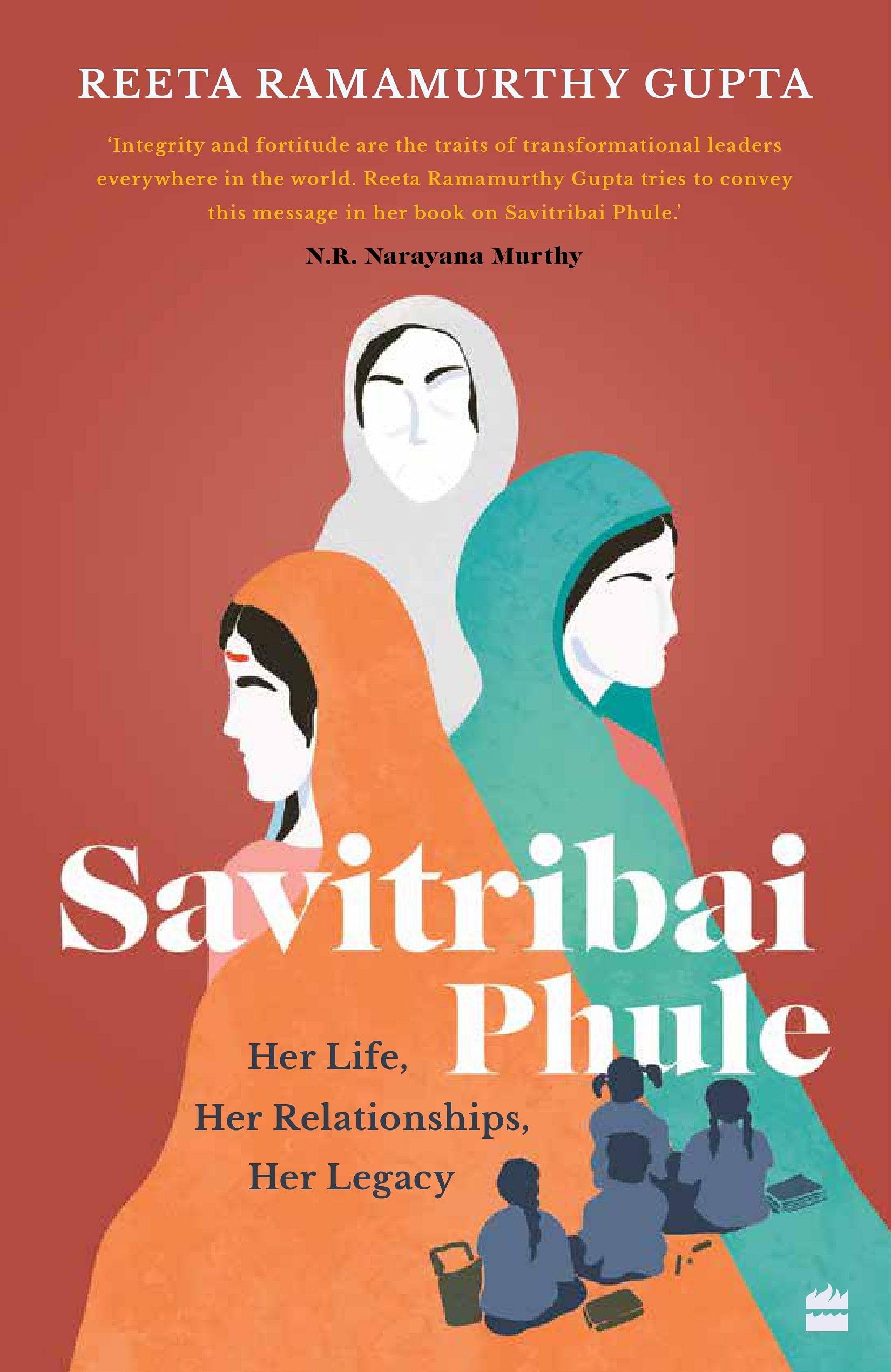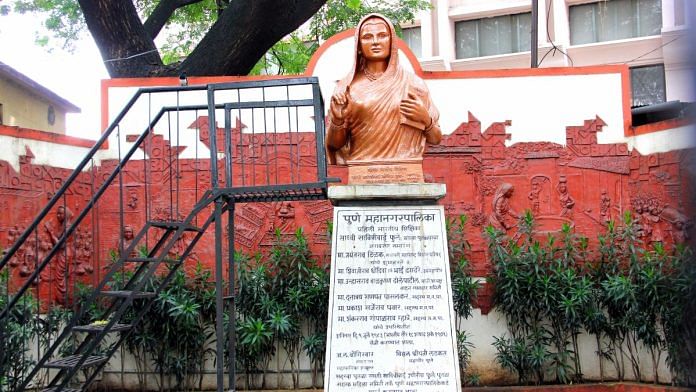Hence, on Christmas day in 1846, a big congregation of Shudras and Atishudras was called. Jyotirao spoke to the crowd and explained to them that they should understand who the real enemy is.
‘What Brahmins teach and what Hinduism is all about are two different things. They are scared that if the Mahars and other Shudras get educated, they cannot be ruled through fear. The Brahmins quote the so-called scriptures, but they don’t let us get educated. If you don’t listen to Brahmins, you will be born as a rat in the next life, they say. Where is the proof of this?’
Tatya Saheb Bhide, a Brahmin by birth and lawyer in the employ of Maharaja Scindia of Gwalior, who owned a house in Poona called Bhidewada, was listening intently.
Jyotirao announced at the sabha that he would start a school for girls. ‘Our girls cannot go to Brahmin schools. Brahmins, teachers, won’t come to where we live. Are we to remain ignorant all our lives?’ he demanded.
Tatya Saheb Bhide was energized by Jyoti’s speech. He agreed to give space in his house for the school. Within a year, Jyoti, Savitri and his friends Sakharam and Keshav created a basic framework for the school. Savitri was appointed teacher and headmistress and Fatima was also appointed as a teacher. The school opened on 1 January 1848.
Some historians suggest that both the Hindu and the Muslim community opposed Fatima for what she was doing. However, Fatima was no stranger to unforeseen tragedies in her life. When she had accompanied Savitri, hand-in-hand, on their journey to gain legitimacy as teachers, the events that played out made both of them develop skins as thick as that of a hippopotamus (and that’s putting it mildly).
On the early morning of 3 January, as Fatima was walking from her home to the school in Bhidewada, a heap of cow dung hit her smack in the face! The stench was unbearable.
Fatima ran to the school and went straight to the bathroom. With a small piece of soap, she scrubbed her face till the smell of dung was washed away. Then she came out of the bathroom, sat outside the door, put her face in her hands and stared into the open space in front. She was shivering, but not with fear; she was upset that she had let the act affect her.
Fatima always hid her tiredness behind her cheerful nature and humour; but today, she let herself feel the exhaustion. The evening before she had received a jolt. Ribbi, a girl who lived in the neighbourhood, all of nine years old, was going to be married off to a forty-year-old widower! Had she spent too much time with British memsahibs, helping them with their clothes? Had she lost touch with her own people? All Fatima could see in front of her eyes was Ribbi.
Just then, Savitri entered.
Fatima told Savitri what had happened the previous day. She was trembling. ‘How can Ribbi’s nikah be arranged with a forty-year-old man!’
Savitri hugged her tight. ‘Don’t lose heart,’ she said.
‘How are we ever going to change anything? I cannot take Ribbi from her house and bring her here. Her father won’t let me.’ Fatima was despondent.
‘Fatima, I have no idea what to do, but we have to take it one step at a time. We enrolled six girls yesterday—that is a start. And maybe we cannot save everyone.’
Savitri picked up the enrolment register lying nearby and read out loud, ‘Annapurna Jogi, Sumite Mokashi, Durga Deshmukh, Madhavi Dhanna, Sonu Pawar and Arna Kardle. Maybe we can change their lives to begin with!’
Fatima continued, ‘Ribbi is very bright. Do you remember the bed sheet that she embroidered for me? Such intricate, progressive patterns! There is so much mathematics in everything she does.’
Savitri nodded in understanding.
‘Salim, Ribbi’s father, screamed at me, saying, “Why do girls need to learn anything except how to keep the house? I don’t want my daughter to end up unmarried like you!”’
Savitri knew that many Muslims saw Fatima as someone who was ‘un-anchored’ and ‘free’. She decided to lighten the mood.
‘Maybe you should make Salim meet Limaye,’ she suggested. ‘Today, on the road, he stopped me and told me that if an educated girl cooks, the food becomes poison.’
‘Then first let us educate Limaye’s wife and see the result!’
The idea was so hare-brained that both Fatima and Savitri burst out laughing. For a moment, Fatima didn’t know whether she was laughing or crying. Small joys on an otherwise difficult day.
Fatima looked at Savitri in admiration as she asked, ‘Aapa, don’t you ever get angry?’
‘Fatima, it is best that you don’t know about my temper! Once, when I was small, I saw a snake going up a tree to eat eggs from a nest. I pelted it with so many stones that the poor thing ran away. Sometimes I wonder, what if the snake had attacked me? What would I have done? I have always been foolish and short-tempered. But with Shetji, I have become mature,’ conceded Savitri.
‘But you saved those eggs,’ Fatima reminded her.‘But for how long? I couldn’t have prevented another snake from coming five minutes later. Unless the birds learn to fly, I cannot help. It is in the snake’s nature to eat eggs.’
Fatima listened keenly. Savitri, it seemed, was no longer talking about snakes but rather about human behaviour.
‘Similarly, unless we can educate more Salims and Ribbis, we cannot always be there to prevent mishaps.’
Fatima nodded, ‘Aapa, it is unfortunate that the birth of a girl has always been unwelcome. Do you know that Amir Khusrau, the scholar, mourned the birth of his daughter—“I wish you were not born and if you were, it would have been better if you had been a boy”.
‘In our rituals too, there is a blessing, “putravati bhava”, which means may you beget a son. The fact remains that if nobody begets daughters, there will be no sons,’ said Savitri.
Fatima sighed. ‘Our fight is that of a hundred years or more.’
The two of them got back to work. Savitri made a poster saying ‘Sakshar Vha, Nirbhar Vha’—Become Literate and Become Independent.
She hung it outside the school.
In the days that followed, Savitri started carrying an extra saree with her because she was regularly pelted with stones and filth. The Brahmins realized that she was not afraid of them. And that made them very afraid!
 This excerpt from Savitribai Phule: Her Life, Her relationships, Her Legacy by Reeta Ramamurthy Gupta has been published with permission from HarperCollins India.
This excerpt from Savitribai Phule: Her Life, Her relationships, Her Legacy by Reeta Ramamurthy Gupta has been published with permission from HarperCollins India.



